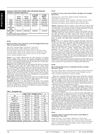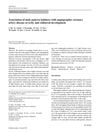 56 citations,
July 2008 in “European journal of endocrinology”
56 citations,
July 2008 in “European journal of endocrinology” Metformin and rosiglitazone improve blood vessel function in women with PCOS, with metformin also reducing insulin resistance and testosterone levels.
 45 citations,
February 2012
45 citations,
February 2012 Obese women with PCOS are more likely to have fatty liver disease.
 October 2013 in “Journal of the American College of Cardiology”
October 2013 in “Journal of the American College of Cardiology” Blood pressure that doesn't drop at night is linked to worse blood vessel function in people with high blood pressure.
 10 citations,
April 2015 in “Netherlands Heart Journal”
10 citations,
April 2015 in “Netherlands Heart Journal” The conclusion is that there's no significant link between male pattern baldness and the severity of coronary artery disease.
 155 citations,
March 2006 in “The American Journal of Medicine”
155 citations,
March 2006 in “The American Journal of Medicine” Women with PCOS have heart-related issues not because of obesity, but due to insulin resistance and low adiponectin levels.
 2 citations,
April 2023 in “Pharmaceuticals”
2 citations,
April 2023 in “Pharmaceuticals” Testosterone therapy for postmenopausal women appears safe and may protect against heart disease, but requires constant monitoring and more research for long-term effects.
101 citations,
August 2008 in “Mayo Clinic Proceedings” PAD is common but often missed, needing lifestyle changes and medication for better outcomes.
27 citations,
August 2008 in “Mayo Clinic proceedings” Early recognition and treatment of Peripheral Arterial Disease is crucial to improve survival and health outcomes.
 658 citations,
June 2003 in “Endocrine reviews”
658 citations,
June 2003 in “Endocrine reviews” Male hormones may play a role in the development of heart disease, and more research is needed to understand their effects.
 13 citations,
August 2016 in “Medical Hypotheses”
13 citations,
August 2016 in “Medical Hypotheses” Hair characteristics might be early signs of Type 2 Diabetes and could help with early prevention.
 1 citations,
May 2002 in “British Journal of Dermatology”
1 citations,
May 2002 in “British Journal of Dermatology” Hair loss caused by longer latent hair cycle and sudden miniaturization, not gradual follicle size reduction.
 January 2020 in “International Journal of Research”
January 2020 in “International Journal of Research” High testosterone increases heart disease risk in women with PCOS.
 May 2002 in “British Journal of Dermatology”
May 2002 in “British Journal of Dermatology” A pregnant woman's skin condition improved after giving birth, possibly due to high estrogen levels during pregnancy.
 May 2002 in “British Journal of Dermatology”
May 2002 in “British Journal of Dermatology” Hair loss caused by longer latent hair cycle and sudden miniaturization, not gradual follicle size reduction.
 1265 citations,
October 2013 in “The Journal of Clinical Endocrinology and Metabolism”
1265 citations,
October 2013 in “The Journal of Clinical Endocrinology and Metabolism” The guideline suggests using specific criteria to diagnose PCOS, recommends various treatments for its symptoms, and advises screening for related health issues.
 467 citations,
October 2014 in “European Journal of Endocrinology”
467 citations,
October 2014 in “European Journal of Endocrinology” The European Society of Endocrinology advises individualized long-term management for PCOS, focusing on lifestyle changes, accurate diagnosis, and treatments for associated health risks and symptoms.
 363 citations,
May 2006 in “Current Opinion in Psychiatry”
363 citations,
May 2006 in “Current Opinion in Psychiatry” Anorexia and bulimia lead to serious health problems and increased risk of death, requiring aggressive treatment.
 343 citations,
December 2008 in “Endocrine Reviews”
343 citations,
December 2008 in “Endocrine Reviews” Metformin helps with menstrual cycles and insulin levels in PCOS but is less effective for hair growth, diabetes prevention, and weight loss, and may improve fertility and reduce diabetes risk.
 251 citations,
October 2014 in “The Journal of Clinical Endocrinology & Metabolism”
251 citations,
October 2014 in “The Journal of Clinical Endocrinology & Metabolism” The guidelines advise against using testosterone and DHEA in women for most conditions due to safety and effectiveness concerns, but suggest considering testosterone for postmenopausal women with low sexual desire.
 215 citations,
March 2011 in “Clinical Cancer Research”
215 citations,
March 2011 in “Clinical Cancer Research” Sorafenib is effective in treating Desmoid Tumor/Deep Fibromatosis.
 200 citations,
October 2009 in “European journal of endocrinology”
200 citations,
October 2009 in “European journal of endocrinology” Metformin helps manage polycystic ovary syndrome by improving insulin resistance and ovulation, but more research is needed on its full effects.
 81 citations,
May 2007 in “Fertility and Sterility”
81 citations,
May 2007 in “Fertility and Sterility” Testosterone therapy seems safe for postmenopausal women for a few years, but more research is needed for long-term effects.
 61 citations,
March 1981 in “Circulation”
61 citations,
March 1981 in “Circulation” Minoxidil improves blood flow in heart failure patients.
 60 citations,
May 2011 in “Endocrinology and Metabolism Clinics of North America”
60 citations,
May 2011 in “Endocrinology and Metabolism Clinics of North America” Polycystic Ovary Syndrome is linked to higher risk of hypertension and heart disease.
 55 citations,
October 1975 in “Circulation”
55 citations,
October 1975 in “Circulation” Minoxidil, propranolol, and furosemide effectively control severe hypertension, but may cause sodium retention.
 50 citations,
March 2011 in “European Journal of Endocrinology”
50 citations,
March 2011 in “European Journal of Endocrinology” Spironolactone improved blood vessel function and cholesterol levels in non-obese women with PCOS.
 27 citations,
January 2018 in “Curēus”
27 citations,
January 2018 in “Curēus” Subcutaneous contraceptives can cause side effects like menstrual changes, headaches, weight gain, and pain at the implant site.
 16 citations,
October 2007 in “Andrologia”
16 citations,
October 2007 in “Andrologia” DHT is a strong androgen that may pose less risk to the prostate compared to testosterone.
 14 citations,
April 2009 in “Acta Medica Scandinavica”
14 citations,
April 2009 in “Acta Medica Scandinavica” Minoxidil helps control blood pressure but has side-effects, so it's not for everyone.
 11 citations,
April 2018 in “Nutrition Research”
11 citations,
April 2018 in “Nutrition Research” Chromium supplements don't help with weight loss or improve hormone and metabolism issues in people with polycystic ovary syndrome.



























